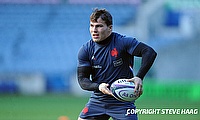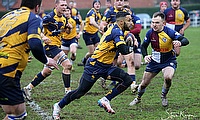England's discipline issues highlight 'need for consistency' across the game

The contractions at the top of the sport has led to more questions being asked further down the English rugby pyramid.
©Harish Chavda
One could argue warm-up games are not usually the time when teams are truly judged.
Yes, you can analyse the positives and negatives, who is playing well and who isn't, but what will be remembered is how a side performs when it matters most.
Normally, pre-tournament matches are where coaches can fine-tune their tactics, where players gain valuable minutes and where hope and optimism grows amongst supporters.
But for Steve Borthwick and England, they are currently experiencing the complete opposite.
With just one pre-World Cup fixture left to come - against Fiji at Twickenham on Saturday - there is nothing calm and calculated about England's preparations for France 2023.
Another one-dimensional display against Ireland in Dublin condemned England to their fourth defeat from their past five Test matches and while their turgid showings are obviously a cause for concern, it is the extra layer of problematic talking points which are only adding to the mounting questions Borthwick is having to deal with.
Losing Billy Vunipiola on Saturday for a high shoulder to a ball carrier's head was the latest unwanted disruption for the England boss, just a week on from Owen Farrell's upgraded red-card against Wales.
Right now, many newspaper columns, opinion pieces and online articles make for grim reading for England supporters but the two incidents involving Vunipola and Farrell don't exactly inject much positivity into the game in general.
When referee Paul Williams indicated he would be taking a look at the actions of Vunipola on Ireland's Andrew Porter at the weekend, many knew what was coming. The Saracens forward was shown a yellow card with a bunker review, and the decision was swiftly upgraded to a red. Another disciplinary hearing is now on the horizon.
Borthwick will be hoping Vunipola's case [which will take place today] is less of a 'circus' than Farrell's has been. Last Tuesday, an independent disciplinary panel cleared the England captain to play following his shoulder-led tackle to the head of Taine Basham, a decision which stunned many who expected Farrell to cop a significant ban.
However last Thursday, World Rugby announced they would be appealing the decision to overturn the red card with Farrell finally set to learn his fate on the same day as Vunipola.
"It is just a dog's dinner now," ex-Premiership referee Ash Rowden told TRU when asked about the Farrell saga.
Richard Smith KC - who represented Farrell in the initial hearing last week - will be preparing for another busy few days with Vunipola's case now in the inbox of England's in-house barrister.
The No 8 is likely to receive a three-week ban, which could be reduced to two if he attends the coveted tackle school, but after Smith had originally got Farrell 'off the hook', surely the same soap opera won't be repeated for Vunipola. "Richard Smith pretty much scored a double century for England at Lord’s against Australia!" Rowden added. "If you break it down, it is as simple as that! England would have viewed it as a right result [last week] but I am not sure how Steve Borthwick will be feeling now."
Rowden revealed to Talking Rugby Union that a source within World Rugby had told him the governing body were "seething" when they found out Farrell had "got away with it" because "they bang on about player safety."
He continued: "I am sure people there do care about player welfare but they can't legislate for disciplinary panels who come up with results like that. This is what happens when you make the judiciary independent. You rely on them to do their job properly and if they don't do their job properly, World Rugby will say that doesn't tick the boxes. The bottom line is all of this hasn't been great for the game."
While also being a former match official, Rowden has a strong affiliation with National One club Rams RFC where he is involved with the first team. He admits the narrative around England's discipline - specifically the saga surrounding Farrell - has only encouraged more question marks to resurface further down the English rugby pyramid.
Back in April, the RFU Council voted to adopt law changes to lower the tackle height in community rugby [levels three and down] to below the base of the sternum, a move designed to improve the welfare of players.
These amendments are now being implemented while at the top of the sport, the tackle height laws remain the same and Rowden believes the recent incidents involving England actually shine a spotlight on where the issue, in terms of player safety, truly lies.
"You get a situation where World Rugby introduce laws at level three and below where people such as me - and I'm not necessarily saying everyone agrees with me - but certainly a percentage of people will take my view that the issue isn't at level three," Rowden says.
"Why are you then introducing laws at this level apparently in the name of player safety and yet Owen Farrell has taken someone out, head high with his shoulder and a disciplinary panel, independent to World Rugby but knowing World Rugby's protocols, has found it to be a yellow card rather than a red? That is where a lot of people will be thinking the two just aren't adding up, are they?
"I have never seen a tackle like that ever at level three. I watched Sale FC v Rams last season in National One. That was the most intense 20 minutes of level three rugby I have seen in that opening quarter. There wasn't a tackle even close to what we saw at the weekend.
"You are trying to make the game safer, so you say World Rugby, but you are penalising the players who it doesn't affect i.e. level three and below and this actually just proves Ash Rowden's point that the issue is at level one. I believe in player safety, but the problem isn't at level three."
It is a view shared by National One player Ollie Stedman. The Birmingham Moseley forward - who has also played at Championship level - is one of many who is getting to grips with the new tackle height laws ahead of the new season.
"If we are trying to make rugby a safer game and these tackle laws are believed to be the safest, why wouldn't they be in all formats of the game?" Stedman tells TRU. "Having watched international rugby at the weekend, the biggest, strongest, most powerful guys surely pose the most risk of concussing someone, for example. If it is about safety, it should be across the whole of the game.
"I question the nature behind the reason of the reduction of tackle height at our level. Is it actually because of safety or is it because of the current climate of what is going on which is making the authorities feel like they need to do something elsewhere?"
Back in 2019, Stedman was part of a trial for a new tackle height law that was rolled out across matches in the Championship Cup. The new rules meant players were not allowed to tackle above the armpit but the trial prematurely ended because of a rise in concussions.
"It was crazy because you had guys who played 20 years of rugby, maybe more, who've learnt their craft, learnt the game and knew what tackle was appropriate and in what circumstances," Stedman says. "You had boys second-guessing themselves. Sometimes you've got to go low and sometimes you have got to go high and there were so many incidents of players getting their heads into awful positions and knees will concuss you a lot easier than a shoulder will.
"I have been concussed twice (2009 and 2015), once in a ruck and once going low, and both of them were knees. I think the risk of getting a knee to the head is a lot more severe than a forearm or a potential sliding up. We know what is at play with the current lawsuits that are ongoing, but they do need to leave rugby alone as it was working pretty well as it was without all these different variations and interpretations."
Stedman recently tweeted that following his first contact session under the new tackle height laws, a hip drop tackle led to him being omitted to A&E for an x-ray on his ankle: “In that scenario, the lad would probably have gone higher, didn't go higher and then slid down my leg, used his body weight to whip round trying to get me to the ground and that is the risk you take. We are substituting one injury for another injury and where does that lie?
"I actually had a comment on one of my Twitter posts from a community coach at level five who said they have had three concussions in the last seven days when doing full contact and thinking about the lower tackle height. That is worrying."
Both Stedman and Rowden have witnessed the new tackle height laws in operation during pre-season friendlies and the duo agree that the grey areas that have been thrown up by the regulations could in fact harm the game.
"As I've said to everyone all along, I worry that players at level three and below will just get frustrated and lose faith in the game because the qualities of the referee they get will vary massively from week to week the lower down the leagues you go,” Rowden adds.
“However, what Ash Rowden thinks as a referee which is below the sternum will be different to referee Ollie Stedman and players will not know what they can and can't do.
"Everyone will say to me it is clear, it is at the base of the sternum and I would go; 'That's great when we are all stood still, not moving and you've got a ruler!’
“Rugby isn't played stationary. What you see on television is deemed acceptable [in the case of Farrell], but it is not acceptable at level three or below or if it is, it varies massively from week to week. It just causes inconsistency."
Stedman jokes he "very rarely feels sorry for referees" but under the new laws in the community game, he does symphatise with them because of the challenges officials are set to face this coming season - and that is without a TMO and a bunker review system (which has been been approved for the Rugby World Cup) to aid their decision-making.
Rowden and Stedman know that, like any call made by a referee, it is all down to interpretation but the events involving England over the last week have further clouded a sport that continues to face its own uphill battles.
"We [Birmingham Moseley] have got a friendly against Coventry [a level two side] coming up," Stedman adds. "Coventry play the 'proper' laws and we play the other laws so where do you stand on that front? Do we practice our game? Do they practice our game? Is there a hybrid? How does it work? That is another frustration.
"The lack of consistency across the levels is crazy and look, I think every player in community rugby and down the chain is just going to have to accept it could be wild this season.
"If there are games where there are a million and one cards and penalties, and the ref's whistle is being blown every minute, is that going to make players want to continue playing? Are we going to see a drop in more players not wanting to play rugby?
"I can't see how it is going to raise the profile of rugby. At best, it is going to keep it level. At worst, it is going to have a detrimental effect and nobody wants that in a sport which continues to struggle for some positivity."









